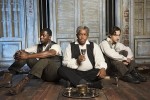Left to right, Carl Kennedy, Tom Pickett and Giovanni Mocibob hold a seder in The Whipping Man. The symbolism of Passover is an integral part of Matthew Lopez’s play. (photo by Emily Cooper)
On April 9, 1865, the day before erev Passover, General Robert E. Lee surrendered his Confederate troops to the Union Army’s General Ulysses S. Grant at Appomattox, Va., ending the four-year American Civil War and setting the stage for the emancipation of African Americans. This intersection of events forms the backdrop of award-winning playwright Matthew Lopez’s powerful three-person drama The Whipping Man, currently at Pacific Theatre. The play, now one of the most produced dramas in America, is a searing exploration of family, friends, faith and freedom.
There were approximately 50,000 Jews in the South at the beginning of the Civil War. Their sons fought for the confederacy. Many of the families were successful and owned slaves. The Whipping Man is the story of one such family, the DeLeons of Richmond, Va.
The play opens on a stormy night with scion Caleb DeLeon (Giovanni Mocibob) returning in defeat from war to find his family’s mansion ransacked and all the slaves gone except for faithful old retainer Simon (Tom Pickett), who has remained to protect the premises and await the return of his wife and daughter. Another slave returns that night, John (Carl Kennedy), who was raised with Caleb – they are like “two peas in a pod,” according to Simon.
John has been on one of his forays, “liberating” food, utensils and other items from abandoned mansions in the area. He returns to find an injured Caleb, whose gangrenous leg needs to be amputated below the knee. Caleb’s refusal to go to the hospital means that Simon, aided by John, must perform the operation. Especially in the intimate space of Pacific Theatre, the intense, bloody scene, where the protagonists are fueled by whiskey and courage, is not for the faint-hearted, even though a judicious lighting cue takes some sting out of the visceral moment.
It was common for slaves to take the religion of their owners and to learn the customs and the rituals of their adopted faith, so, for Passover, Simon decides they need to have a seder. He sets about to find appropriate items for the seder plate from what little is left after the war: collard greens instead of bitter herbs, small squares of hardtack military ration as matzah, and the shank bone of Caleb’s dead horse, all to be accompanied by the requisite cups of (stolen) wine.
As the three sit among the ruins of the home that connects them, the words and songs of the Haggadah, celebrating the delivery of the Jews from bondage in Egypt, take on new meaning. Simon and John are now no longer slaves; Caleb is not anyone’s master. All three men are presumably equal and the interpersonal dynamics shift. Simon declares to Caleb at one point, “You don’t tell me what to do anymore, you ask me.” Each character must grapple with the upheaval of their world and the new freedom and responsibilities that it brings. As they work through their angst, secrets are disclosed that will forever change their lives.
The acting in this production is sublime. All three men give riveting performances, along with respectable southern accents.
Mocibob, who spends most of the time immobilized under a blanket on the stage – his leg having been amputated – peels away at the layers of his character, who has lost his faith, both literally and figuratively, during the years of war and who faces a moral conundrum regarding his family’s ownership of slaves, which, of course, affects his relationships to John and to Simon and his family.
Kennedy hits the right balance of pathos and anger in his portrayal of the young self-educated slave John, his experiences with the whipping man (a white man to whom Caleb’s father and other slave owners would send their slaves to be punished with lashings from a bull whip) and his slow acceptance of the reality of a crime he has committed.
But it is Pickett who really shines, as the wise old man who has seen it all and yet somehow remains unjaded. He infuses a majestic calmness into the role of Simon. We hear the heartbreaking recollection of Simon’s own whippings and the physical and emotional scars they left behind. We witness his stoicism when he receives news of the death of beloved “Father Abraham” (Abraham Lincoln, the “American Moses”) and hears of the fate of his family.
The set of The Whipping Man is appropriately dark and ominous. Fallen bricks and broken floorboards are set off with shadowy blue lighting and the glow of candlelight; the sound design is a mournful mix of rain and thunder. The shabby costumes add to the grit and desperation of the story. Together, the visual and audio serve as metaphors for the postwar devastation and confusion.
The play, while set more than 150 years ago, is still vitally relevant for contemporary audiences. Slavery, sadly, still exists and The Whipping Man program contains some data on modern-day slavery; hopefully, the play will encourage discussion about and involvement in combating it.
Theatre does not get much better than this – our attention is completely absorbed and we are transported to another time and place, yet by material that speaks to issues with which we still wrestle. There are Jessies on the horizon for this production.
Tickets for The Whipping Man, which runs until March 21, are available at pacifictheatre.org and 604-731-5518. The show is not suitable for children.
Tova Kornfeld is a Vancouver freelance writer and lawyer.

